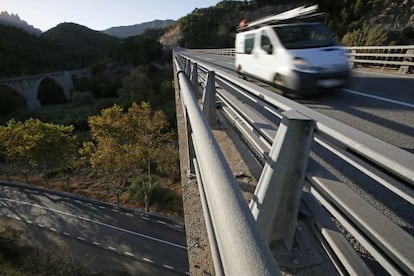Prostitute who took own life had been fined five times by police
Support groups say that practice "victimizes" roadside sex workers


A 24-year-old prostitute who committed suicide on September 23 of this year had been fined a total of five times by the Catalan police for soliciting clients by the roadside.
Since the summer of 2012, the regional authorities — known as the Mossos d'Esquadra — have been targeting sex workers and their clients all along Catalonia's roads, in observance of a legislative change that prohibits prostitution on the curbside. This is an indirect way of addressing the issue of prostitution, which is neither legal nor illegal under current legislation in Spain.
Under the new road safety rules, offering sexual services by the roadside can carry fines of up to 30,000 euros. Since the new legislation went into effect, the Mossos have handed out 1,061 fines, of which only 30 (issued to clients) have been paid, bringing in 60,000 euros in revenues for the regional government.

The sex worker who killed herself, Adriana D., was fined on November 12, 2012, and then again on February 1, 14 and 25 of this year. There is one more fine with no specific date that shows up in the regional gazette, the Diari Oficial de la Generalitat de Cataluña. The Catalan Department of Internal Affairs has declined to provide any further information regarding the case.
Adriana's pimp was her own husband, whom she married at the age of 16 and with whom she had a child, now aged four. She was part of a group of 200 women who were being abused by the same clan of procurers. Last week, a police operation busted this ring, and Adriana's husband was arrested. But it was too late for her — she had already jumped off the bridge a short way off the spot on the C-58 where she used to sit on a plastic chair. Although a 2010 investigation had already identified her as a possible victim of sexual exploitation, Adriana had refused to give testimony because of the relationship she had with her procurer.
The Catalan Department of Internal Affairs claims that since the new rule went into effect, there has been a 60-percent drop in the number of prostitutes found along the roads. But the truth is that many of them stopped seeking clients on the N-II national highway ever since heavy-goods traffic was restricted there; many others observe an unspoken agreement with the police to stand 50 meters from the curb so they won't be seen by drivers.
"It's political hypocrisy. They care about fining them, but not about whether they need help," said a police source from a unit that specializes in combating sex mafias. "The street prostitutes are despised by everyone: by their pimps, by their clients and by other women who work in clubs and consider them inferior to themselves. Slapping them with fines victimizes them even more."
The non-profit groups that work with prostitutes say that fines are not the right way to fight the problem. "We are talking about a serious case of revictimization, and it means that something is not working properly," says Rosa María Cendón, from the religious support group SICAR. "The fines are just a way of making women invisible, unless the plan comes with resources and efforts against prostitution and sexual exploitation."
Adriana's husband was arrested. But it was too late — she had already jumped off the bridge
"It is not very ethical for a society to prioritize the issue of visibility using the excuse of road safety," adds Clarisa Velocci, of an association called Genera. "For [Adriana] to have been fined did not help her situation at all, it only made it worse. She was pressured by the police on one hand and by her torturers on the other."
Velocci also feels that "if it is proven that this young woman was the victim of people-trafficking, then all sorts of international treaties could have been violated, and the state could end up standing trial."
Every association consulted by EL PAÍS agreed that it is very hard for a victim of sexual exploitation to trust in the police officer who is handing her a fine. Rocío Nieto, of a support group called APRAMP, instead favors rescue units whose members include former prostitutes who were able to escape that life and are now helping others do the same. Nieto says that the goal should be "busting those rings," not collecting fine money.
Tu suscripción se está usando en otro dispositivo
¿Quieres añadir otro usuario a tu suscripción?
Si continúas leyendo en este dispositivo, no se podrá leer en el otro.
FlechaTu suscripción se está usando en otro dispositivo y solo puedes acceder a EL PAÍS desde un dispositivo a la vez.
Si quieres compartir tu cuenta, cambia tu suscripción a la modalidad Premium, así podrás añadir otro usuario. Cada uno accederá con su propia cuenta de email, lo que os permitirá personalizar vuestra experiencia en EL PAÍS.
¿Tienes una suscripción de empresa? Accede aquí para contratar más cuentas.
En el caso de no saber quién está usando tu cuenta, te recomendamos cambiar tu contraseña aquí.
Si decides continuar compartiendo tu cuenta, este mensaje se mostrará en tu dispositivo y en el de la otra persona que está usando tu cuenta de forma indefinida, afectando a tu experiencia de lectura. Puedes consultar aquí los términos y condiciones de la suscripción digital.








































